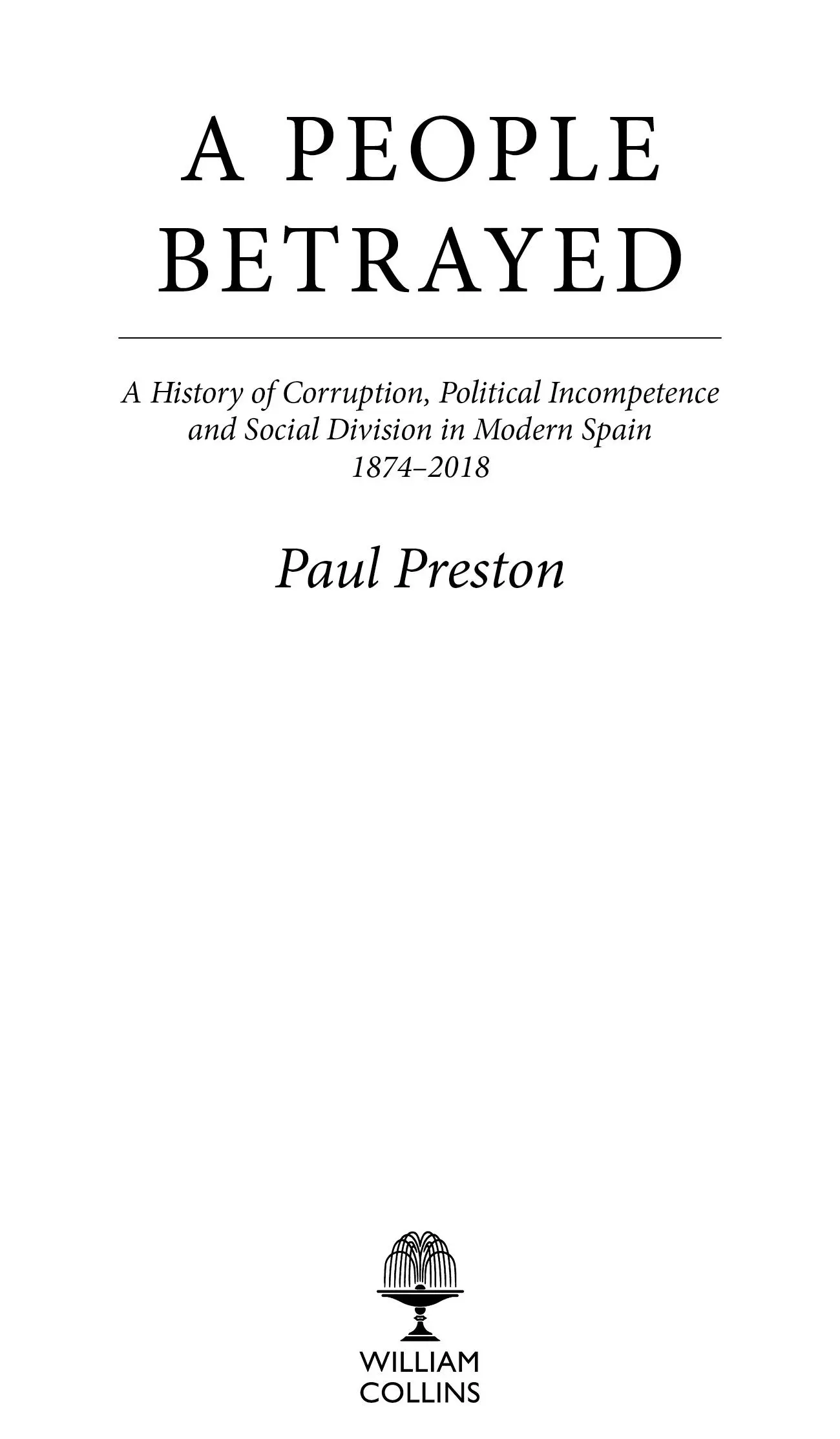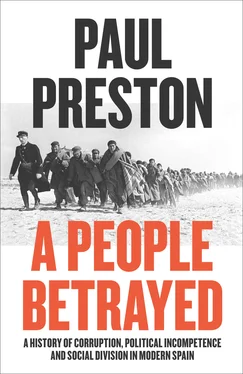
William Collins
An imprint of HarperCollins Publishers
1 London Bridge Street
London SE1 9GF
WilliamCollinsBooks.com
This eBook first published in Great Britain by William Collins in 2020
Copyright © Paul Preston 2020
Cover photograph © Robert Capa/International Center of Photography/Magnum Photos
Paul Preston asserts the moral right to be identified as the author of this work
A catalogue record for this book is available from the British Library
Information on previously published material appears here.
All rights reserved under International and Pan-American Copyright Conventions. By payment of the required fees, you have been granted the non-exclusive, non-transferable right to access and read the text of this e-book on screen. No part of this text may be reproduced, transmitted, down-loaded, decompiled, reverse engineered, or stored in or introduced into any information storage and retrieval system, in any form or by any means, whether electronic or mechanical, now known or hereinafter invented, without the express written permission of HarperCollins.
Source ISBN: 9780007558391
eBook Edition © February 2020 ISBN: 9780007558384
Version: 2021-01-12
For María Jesús González
and
Linda Palfreeman
1 Cover
2 Title Page
3 Copyright
4 Dedication
5 Contents
6 Preface
7 1 Spanish Stereotypes? Passion, Violence and Corruption
8 2 Violence, Corruption and the Slide to Disaster
9 3 Revolution and War: From the Disaster of 1898 to the Tragic Week of 1909
10 4 Revolution and War: From the Tragic Week of 1909 to the Crisis of 1917–1918
11 5 A System in Disarray: Disorder and Repression, 1918–1921
12 6 From Colonial Disaster to Dictatorship, 1921–1923
13 7 The Primo de Rivera Dictatorship: The Years of Success, 1923–1926
14 8 The Primo de Rivera Dictatorship: The Years of Failure, 1926–1931
15 9 The Second Republic: Reform and Frustration, 1931–1933
16 10 The Black Years and the Coming of War, 1933–1936
17 11 Civil War: Hatred, Incompetence and Profit, 1936–1939
18 12 World War: Survival, Hypocrisy and Profit, 1939–1945
19 13 The Franco Regime: Corruption and Terror, 1945–1953
20 14 The Franco Regime: Corruption and Complacency, 1953–1969
21 15 The Twilight Years of a Corrupt Regime, 1969–1975
22 16 The Painful Creation of a Democracy, 1975–1982
23 17 The Grandeur and Misery of a Newborn Democracy, 1982–2004
24 18 The Triumph of Corruption and Incompetence, 2004–2018
25 Acknowledgements
26 Notes
27 Index
28 By the Same Author
29 About the Author
30 About the Publisher
Landmarks CoverFrontmatterStart of ContentBackmatter
List of Pages iii iv v ix x xi xii xiii xiv xv xvi xviii 1 2 3 4 5 6 7 8 9 10 11 12 13 14 15 16 17 18 19 20 21 22 23 24 25 26 27 28 29 30 31 32 33 34 35 36 37 38 39 40 41 42 43 44 45 46 47 48 49 50 52 53 54 55 56 57 58 59 60 61 62 63 64 65 66 67 68 69 7071727374757678 798081828384858687888990919293949596979899100101102 103104105106107108109110111112113114115116117118119120121122123124125126128 129130131132133134135136137138139140141142143144145146147148149150151152153154155156 157158159160161162163164165166167168169170171172173174175176177178179180181182183184185186187188189190191192193194196 197198199200201202203204205206207208209210211212213214215216217218219220221222223224225226 227228229230231232233234235236237238239240241242243244245246247248249250251252253254255256258 259260261262263264265266267268269270271272273274275276277278279280281282283284285286287288289290291292293294295296297298299300302 303304305306307308309310311312313314315316317318319320321322323324325326327328329330332 333334335336337338339340341342343344345346347348349350351352353354355356357358359360361362363364365366368 369370371372373374375376377378379380381382383384385386387388389390391392393394395396397398399400401402 403404405406407408409410411412413414415416417418419420421422423424425426427428429430431432433434435436437438 439440441442443444445446447448449450451452453454455456457458459460461462463464465466467468469470 471472473474475476477478479480481482483484485486487488489490491492493494495496497498499500501502503504505506507508 509510511512513514515516517518519520521522523524525526527528529530531532533534535536538 539540541542543544545546547548549550551552553554555556557558559560561562563564565 567568 569570571572573574575576577578579580581582583584585586587588589590591592593594595596597598599600601602603604605606607608609610611612613614615616617618619620621622623624625626627628629630631632633634635636637638639640641642643644645646647648649650651652653654655656657658659660661662663664665666667668669670671672673674675676677678679680681682683684685686687688689690691692693694695696697698699700701702703 707708709710711712713714715716717718719720721722723724725726727728729730731732733734735736737738739740741742743744745746747748749750 ii
The philosopher José Ortega y Gasset wrote in 1921: ‘Starting with the monarchy and moving on to the Church, no national authority has thought of anything but itself. When has the heart, after all foreign, of a Spanish monarch or of the Spanish Church ever beat for ends that were deeply Spanish? As far as is known, never. They have done the exact opposite. They have ensured that their ends have been adopted as if they were in the national interest.’ 1In similar vein, the poet Antonio Machado, during the Spanish Civil War, wrote to a Russian friend, the novelist, David Vigodsky: ‘The best thing in Spain is the people. That is why the selfless and heroic defence of Madrid, which has astounded the world, moves me but it does not surprise me. It has always been like that. In difficult times, the señoritos – our Boyars – invoke the fatherland and then they sell it; the people do not even mention it but they buy it back with their blood and they save it. In Spain, it is impossible to be a decent person and not love the people. For us, love of the people is a basic duty of gratitude.’2
Similar views were expressed in the nineteenth century by the English romantic travellers. The most celebrated, Richard Ford, author in 1845 of A Handbook for Travellers in Spain and one year later of Gatherings in Spain , portrayed ordinary Spaniards as generous and noble while referring constantly to bad government and misgovernment: ‘The real permanent and standing cause of Spain’s thinly peopled state, want of cultivation, and abomination of desolation, is BAD GOVERNMENT, civil and religious.’ He claimed that, at all levels of government, there were despots always open to bribes.3 Gerald Brenan agreed to a certain extent: ‘Spain has been seen as the land of paradox where a people of great independence of character allowed themselves to be governed by corrupt and arbitrary rulers.’ However, commenting on the extent to which such criticisms derived from an idealized image of Britain at the time when Ford was writing, Brenan remarked: ‘He has much to say of Spanish mismanagement and poverty, yet who would not have preferred to be a Spanish workman in those days to an English miner or mill-hand or agricultural labourer?’4
The present volume is another work written by a British historian who loves Spain and one who has spent the last fifty years studying the country’s history.
Читать дальше













